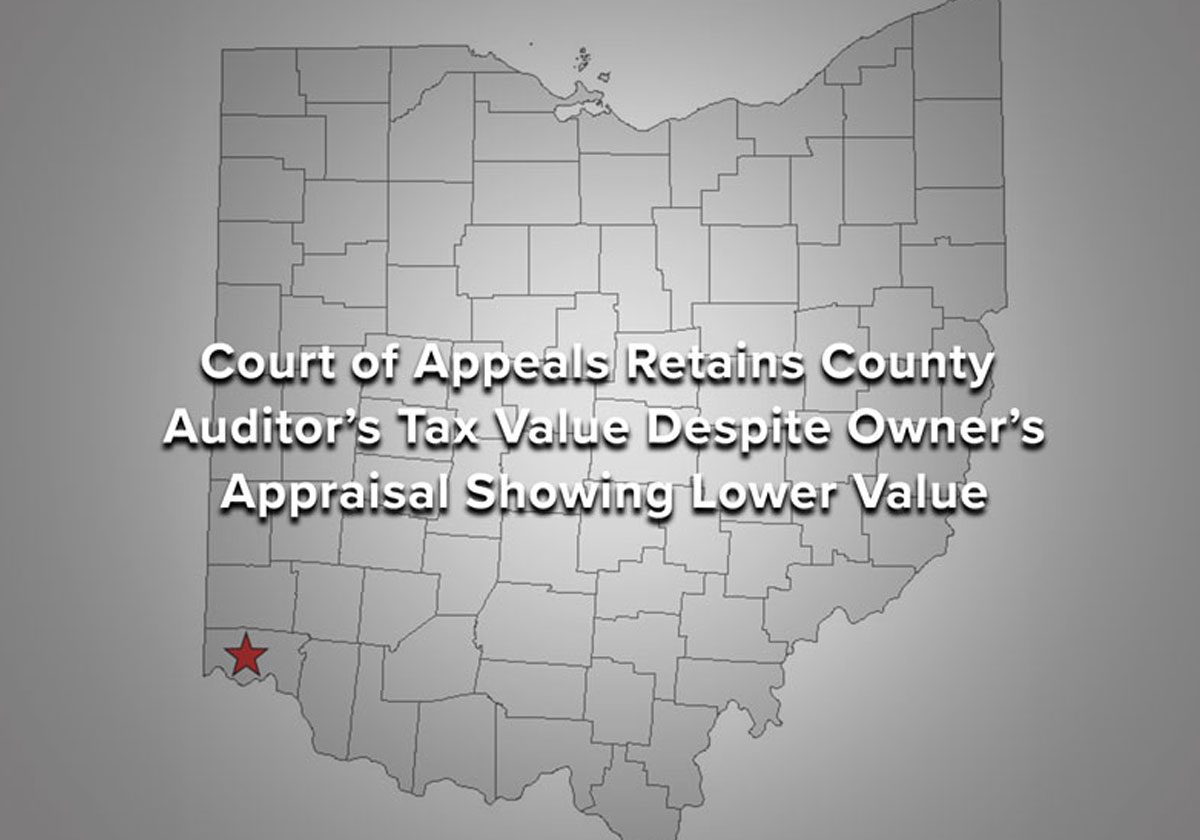The First District Court of Appeals denied a taxpayer’s request to lower the tax valuation for its property. The taxpayer claimed that its appraisal supported a lower value, and asserted that its appraisal must be adopted because no evidence supported the auditor’s assessment. Although the decision does not articulate any new standard, it reinforces the taxpayer’s burden to prove a lower value, and clarifies when the auditor’s valuation can be retained despite the owner’s evidence favoring a reduction. The decision is Colerain Capital, L.L.C. v. Hamilton Cty. Aud., 2023-Ohio-56, which was issued on January 11, 2023.
Colerain Capital, LLC (“Colerain”) had purchased the property in December of 2014 for $1,916,145. The Auditor assessed the property at a value of $1,916,150 for tax years 2014 and 2017. That value was also used by the Hamilton County Auditor for Tax Year 2019.
Colerain filed a tax valuation complaint for tax year 2019 with the Hamilton County Board of Revision (“Hamilton County BOR”), seeking a lower value than the $1,916,145 Auditor’s value. Colerain submitted an appraisal report which concluded that the value of the property was $1,130,000. The school board (Northwest Local School District Board of Education) filed a counter complaint, seeking to retain the Auditor’s value. The Hamilton County BOR voted to retain the Auditor’s value. Colerain thereafter appealed the decision not to the Board of Tax Appeals, but to the common pleas court (which is permitted for owners, but not for school districts). See R.C. 5717.05.
At the common pleas court, the school board presented an appraisal (the “Jackson appraisal”) which opined that the value of the property was $1,900,000 (a mere $16,150 lower than the Auditor’s value). The common pleas court found that Colerain had not met its burden of proof to be entitled to a reduction in value, and affirmed the Hamilton BOR’s decision, upholding the $1,916,145 Auditor’s value. At all relevant times, the property was leased to a home-improvement store. Colerain at ¶ 2.
Colerain’s sole assignment of error in its appeal to the First District Court of Appeals was that the common pleas court erred by retaining the Auditor’s assessed value “although all the evidence in the record contradicted it and no evidence supported it” (as alleged by Colerain). Id. at ¶ 8.
The First District Court of Appeals disagreed with Colerain and affirmed the judgment of the common pleas court. In articulating the standards, the court wrote:
Ordinarily, the party challenging the BOR’s decision has the burden of proof to establish its proposed value for the property. Colonial Village, Ltd. v. Washington Cty. Bd. of Revision, 123 Ohio St.3d 268, 2009-Ohio-4975, 915 N.E.2d 1196, ¶ 23, citing Dayton-Montgomery Cty. Port Auth. v. Montgomery Cty. Bd. of Revision, 113 Ohio St.3d 281, 2007-Ohio-1948, 865 N.E.2d 22, ¶ 15. Consequently, neither the BOR nor the Auditor need offer proof of the county’s valuation. Id. Thus, the trial court is justified in retaining the county’s valuation of the property when the party challenging the valuation has not carried its burden of proof. Colonial Village at ¶ 23, citing Dayton-Montgomery at ¶ 15; Simmons v. Cuyahoga Cty. Bd. of Revision, 81 Ohio St.3d 47, 48, 689 N.E.2d 22 (1998).
Colerain at ¶ 11. However, the court noted an exception to the general rule:
There is a “narrow exception” that derives from these general rules. Colonial Village at ¶ 24. Although the BOR and Auditor need not offer any proof to sustain the county’s valuation, if the record affirmatively negates the county’s claimed valuation, the trial court may not retain the county’s valuation. Id.; Dayton Montgomery at ¶ 27. Specifically, “when the evidence presented to the board of revision or the BTA contradicts the auditor’s determination in whole or in part, and when no evidence has been adduced to support the auditor’s valuation, the BTA may not simply revert to the auditor’s determination.” (Emphasis added.) Dayton Montgomery at ¶ 27.
Colerain at ¶ 12. Colerain, the taxpayer here, alleged that the “narrow exception” described above applied because, according to Colerain, “there is literally no evidence in the record” to support the Auditor’s or the BOR’s valuation of the property.
The Court of Appeals disagreed that there was “no evidence (to support the Auditor)” and found that the “narrow exception” was inapplicable because “there is ample, competent evidence to support the Auditor’s valuation (which included the appraisal).” Colerain at ¶ 14. The court identified three pieces of evidence favoring the Auditor’s valuation: the computer assisted mass appraisal data used by the Auditor, the 2014 sale price, and the Jackson appraisal submitted by the school board. Id. The Court noted, “Although the Jackson appraisal does not precisely equal the Auditor’s valuation to the dollar, we cannot say that an appraisal that is 99.1 percent of the Auditor’s valuation does not support that valuation.” Id.
The take-away from this decision is twofold. First, there is a strong general rule that “neither the BOR nor the Auditor need offer proof of the county’s valuation.” Second, the “narrow exception” in a case where the record “affirmatively negates” the Auditor’s value is very narrow indeed, and any quantum of evidence including the Auditor’s own mass appraisal calculation and a competing appraisal concluding a different value from the Auditor’s value may, in a given case, make the exception inapplicable.


